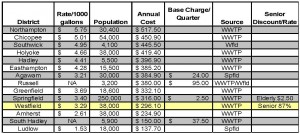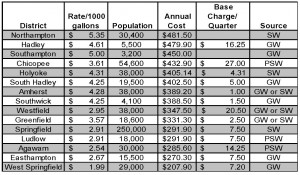 WESTFIELD – The Water Commission initiated a discussion of revenue generated by the city wastewater fee which supports the operation of the wastewater treatment plant and expansion of the city’s sewer system.
WESTFIELD – The Water Commission initiated a discussion of revenue generated by the city wastewater fee which supports the operation of the wastewater treatment plant and expansion of the city’s sewer system.
The City Council bifurcated the sewer and sewerage treatment functions of the city when it created the Water Resource Department, moving the treatment plant out of control of the Board of Public Works and under the Water Commission.

That division has put the mechanical part of the sewer system, the treatment plants and sewerage pump station, under the Water Commission, which now controls revenue generated through the wastewater fee, but left the gravity system, the sewer lines, under the control of the BPW, which has no revenue stream to maintain or expand the system.
Historically, there has been a annual problem with both the Water Division, which provides city residents and businesses with drinking water, and the sewerage treatment plant budgets because state law limits the current fiscal year budget number to the total receipts of the previous year.
The City Council has to cut the budgets, then later restore funding for both departments, often several times a year.
The Water Commission, which is authorized to set the water rates, has initiated a process of increasing rate to generate sufficient annual revenue to end the cut and restore process.
The sewer fees are set by the City Council, which usually makes it a political decision, rather than a pragmatic decision based on the cost of doing business.
Water Chairman Ron Cole said the commission makes decisions on the water rate based on hard data, what rate supports the cost of operating the water division and supports the ability to finance bond debt for needed infrastructure improvements.
Cole said the commission and the BPW need to provide the same hard facts and financial analysis in support of a sewer rate increase to the City Council, but also acknowledged that it involves a political process when under council consideration.
Water Resource Superintendent Dave Billips suggested a study on the sewer rates similar to one performed by Tighe & Bond which provided hard data to the Water Commission as it considered a water rate increase.
Billips said that the city’s water and sewer rates are chronically among the lowest in the region and provided the Westfield News with charts, one recently done for water rates. The sewer rate chart is a 2009 study of rates in the region (and would be updated through the proposed sewer rate study).

